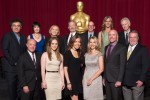Patty Jones first began writing her narrative in a Starbucks in New York. In a matter of months, her five-page narrative would be transformed into an award-worthy screenplay.
On Oct. 21, it was announced that Jones, who completed the UCLA Professional Program in Screenwriting, was one of five winners of this year’s Nicholl Fellowships in Screenwriting, an international screenwriting competition that was created in association with the Academy of Motion Picture Arts and Sciences. An awards ceremony was held on Thursday in Beverly Hills to commend the winners.
Jones’ winning submission, “Joe Banks,” is a comedy that she wrote while taking the online version of UCLA’s professional screenwriting course from her home in Vancouver, Canada, just one year ago.
“I woke up one morning, and I started to think about this character, the father, who’s very colorful and over-the-top, and then I thought to myself, what if someone thinks one person’s their father and finds out someone else is?” Jones said.
Jones said the story of “Joe Banks” is a wild comic odyssey about a son, conceived using sperm from a sperm bank, who believes his father is an esteemed Nobel Prize-winning novelist and aspires to be like him. His true father is actually a “drinking airport novelist” whose Nobel Prize was taken away after a sex scandal. Together, father and son get to know each other during a wild book tour and discover themselves along the way.
“It’s sort of (a story) about who you are. … We all kind of wonder about our identity and what we’re going to achieve in life,”said Jones. “Maybe it’s even reflective of the way I think sometimes about myself. You sort of wonder, what am I doing, who am I and how successful am I going to be?”
Before participating in UCLA’s program, Jones attended the University of British Columbia, earning her master’s degree in creative writing. She now works as a freelance journalist writing for a Canadian publication, the Georgia Straight, where she said she has been able to interview and connect with people in the film industry.
“I did a lot of journalism where I was interviewing a lot of actors and doing film stuff. … I really felt like I missed fiction and writing movies,” Jones said.
Over the course of four months, Jones was able to successfully complete a first draft of “Joe Banks” during her UCLA course with the help of her instructor, Alex Metcalf, before submitting a rushed second draft to the Nicholl Fellowships.
“(Jones’) writing style is actually very fluid and very natural. She has an innate sense of character and dialogue and what is funny with characters,” said Metcalf, a faculty member of the UCLA Professional Program in Screenwriting. “I think that students, or writers at least, tend to work best when it’s about their scripts, so I tend to be very hands-on about the material in front of me … and (Jones) responded really well to that.”
This year, 7,251 scripts were submitted to the Nicholl Fellowships, and after a long period of deliberation, five fellows were chosen and received $35,000 each. Over the next year, each of the fellows is required to write another original feature-length screenplay.
The Nicholl Fellowships Committee is comprised of 14 people, including esteemed writers and filmmakers, who make the final decisions about which five scripts are the best.
“It doesn’t matter what genre (the scripts) are in, it doesn’t matter what kind of a story they tell, it doesn’t matter whether they’re incredibly serious and about a significant subject matter or a fantasy about a talking dog,” said Greg Beal, director of the Nicholl Fellowships. “They’re looking for the best stories, the best storytelling, the best craft and the best writing.”
“There is no better screenwriting competition, and no better award unless you actually win the Oscar,” said Jones.
Jones said she has been meeting various people in Los Angeles in an attempt to turn her written dialogue into a visual production.
“What the competition does instantly for (the writers) is open doors into the industry. Some of them have done quite a good job over the years of going through those open doors, and others have not done as well. But instantly right now, for someone like … Jones, doors have been flung open,” Beal said.
One of the main purposes of the fellowship is to encourage new screenwriters to keep writing, and Jones said she has no intentions of stopping.
“I love to write,” she said. “It’s like a really good drug addiction.”
